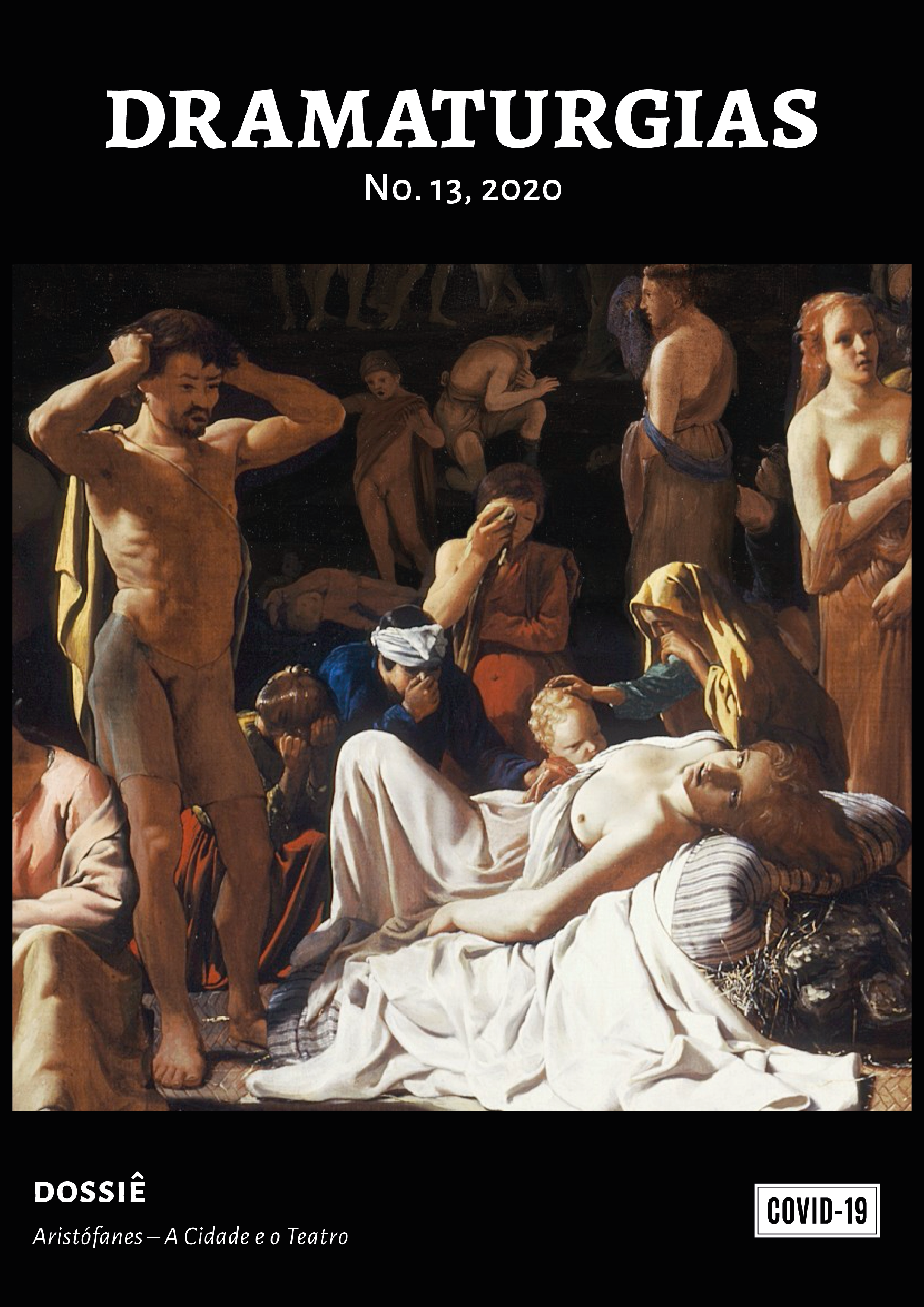A Queda do herói cômico: o papel do protagonista em Nuvens, Vespas e Tesmoforiantes
DOI:
https://doi.org/10.26512/dramaturgias.vi13.31057Palavras-chave:
Herói coÌ‚mico. Aristófanes. Hamartia. Peripécia. Poneria.Resumo
Este trabalho tem por objetivo a análise da atuação do protagonista nas peças aristofá‚nicas Nuvens, Vespas e Tesmoforiantes, como um referencial da função pedagógica do poeta na Grécia antiga. Para McLeish (1980: 53), visto que qualquer comentário acerca dos acontecimentos na ação dramática é feito pelas personagens (e pelo coro) e não por um narrador, a escolha de um tipo de herói é, portanto, um ato de crítica e de didática. As peças em análise apresentam heróis que, diferentemente do que ocorre com os protagonistas das demais comédias aristofá‚nicas que chegaram até nós, são enredados pelas suas próprias ações, resultando em sua queda e consequente transformação. Conceitos como hamartia e peripeteia, tradicionalmente usados na análise da tragédia, têm um lugar significativo em nossa abordagem das três comédias aristofá‚nicas.
Downloads
Referências
ARISTOPHANES. Aristophanis Comoediae: Acharnenses, Equites, Nubes, Vespas, Pacem, Aves. Text and notes by F.W. Hall; W.M. Geldart. Nova York: Oxford University Press, 1906. [1902]
____. Aristophanis Comoediae: Lysistratam, Thesmophoriazusas, Ranas,
Ecclesiazusas, Plutum, Fragmenta. T. II. Text and notes by F.W. Hall; W.M.
Geldart. Nova York: Oxford University Press, 1907.
ARISTÓTELES. Ethica Nicomachea I 13 III 8: Tratado da Virtude Moral. Trad. e
notas Marco Zingano. São Paulo: Odysseus, 2008, ISBN 978-85-88023-98-
7, 224 p.
ARISTÓTELES. Ethica Nicomachea V: Tratado da Justiça. Trad. e notas Marco
Zingano. São Paulo: Odysseus, 2016, ISBN 978-85-88023-98-7, 224 p. ARISTÓTELES. Poética. Trad., introdução e notas de Paulo Pinheiro. São Paulo:
Editora 34, 2015.
ARISTÓTELES. Poética. Trad. e notas de Ana Maria Valente. Lisboa: Fundação
Calouste Gulbenkian, 2008.
ARISTÓTELES. Retórica. Pref. e introd. de Manuel Alexandre Júnior. Trad. e
notas Manuel Alexandre Júnior, Paulo Farmhouse Alberto e Abel do
Nascimento Pena. Lisboa: Imprensa Nacional ”“ Casa da Moeda, 2005. CORREÌ‚A, Paula da Cunha. “O riso γελαÌω na poesia mélica, elegíaca e já‚mbica
grega do período arcaico”. In: Letras Clássicas. n. 7. São Paulo: Edusp, 2003.
p. 95-125.
CORREÌ‚A, Paula da Cunha. Armas e Varões: a Guerra na Lírica de Arquíloco. São
Paulo: Fundação Editora da UNESP, 1998.
DUARTE, Adriane da Silva. O dono da voz e a voz do dono ”“ a parábase na comé-
dia de Aristófanes. São Paulo: Humanitas/ FFLCH/ USP/ FAPESP, 2000. DUARTE, Adriane da Silva. “A catarse na comédia”. In: Letras Clássicas. n. 7 São
Paulo: São Paulo: Edusp, 2002, 2003. p. 11-24.
DUARTE, Adriane da Silva. Cenas de reconhecimento na poesia grega. Campinas:
Editora da Unicamp, 2012.
HALLIWELL, Stephen. Aristotle's Poetics. Chicago: University of Chicago Press, 1998. JANKO, Richard. Aristotle on Comedy: Towards a Reconstruction of Poetics II.
Londres: Duckworth, 2002. [1984]
KIBUUKA, Greice. “A ópsis na poesia dramática segundo a Poética de Aristóteles”.
In: Anais de Filosofia Clássica. vol. 2 n. 3, 2008. Link: https://revistas.ufrj.
br/index.php/FilosofiaClassica/article/view/17039
MAGNELLI, Enrico. “Rethinking Aristophanes’ Comic Hero: Utopianism,
Ambiguity, and Athenian Politics”. In: Polis: The Journal for Ancient Greek and Roman Political Thought. v. 34, issue 2. p. 390-404. Link: https://brill. com/view/journals/agpt/34/2/article-p390_390.xml?language=en
McLEISH, Kenneth. The Theatre of Aristophanes. Londres: Thames and Hudson, 1980. ______. Dicionário de Teatro. Trad.: J. Guinsburg e Maria Lúcia Pereira. 3 ed. São
Paulo: Perspectiva, 2007 [1987].
PEREIRA, Maria Helena da Rocha. Obras de Maria Helena da Rocha Pereira II: Estudos sobre a Grécia Antiga: Artigos. Coimbra: [s.n.]. Link: https://classica- digitalia.uc.pt/pt-pt/livro/obras_de_maria_helena_da_rocha_pereira_ ii_estudos_sobre_grécia_antiga_artigos
PINHEIRO, Paulo. Notas. In: ARISTÓTELES. Poética. Trad., introdução e no- tas de Paulo Pinheiro. São Paulo: Editora 34, 2015.
PLATÃO. Fedro. Trad. Carlos Alberto Nunes. Belém: Editora UFPA, 2003. PLATÃO. Górgias. Obras II. Trad. Notas e Int. de Daniel R. N. Lopes. São Paulo:
Perspectiva/FAPESP, 2011.
POMPEU, Ana Maria César; SANTOS, Bárbara Araújo dos; SALES, Manuela
Maria Campos. “O herói coÌ‚mico: Trigeu e o escaravelho na Paz de Aristófanes.” In: Letras Escreve. v. 7, n. 3, 2017. p. 85-100. Link: https://periodicos.unifap. br/index.php/letras/article/view/3281
RICOUER, Paul. A metáfora viva. Trad. Dion Davi Macedo. São Paulo: Edições Loyola, 2000.
SEGAL, Erich. The Death of Comedy. Harvard: Harvard University Press, 2001. SCHERE, María Jimena. “El tópico del burlador-burlado en los Caballeros de
Aristófanes”. In: Nova Tellus. v. 30, n. 1, 2012. p.19-41. Link: https://www. searchgate.net/publication/317435372_El_topico_del_burlador-burlado_ en_los_Caballeros_de_Aristofanes
SIFAKIS, G. M. “The Structure of Aristophanic Comedy ”. The Journal of Hellenic Studies. v. 112. 1992. p. 123-142. Link: http://links.jstor.org/sici?si- ci=00754269%281992%29112%3C123%3A TSOAC%3E2.0.CO %3B2-T.
TELÓ€, Mario. Aristophanes and the Cloak of Comedy: affect, aesthetics, and the canon. Chicago; London: University of Chicago Press, 2016.
THIERCY, Pascal. Aristophane: fiction et dramaturgie. Paris: Les Belles Lettres, 1986. WHITMAN, Cedric. Aristophanes and the Comic Hero. Cambridge, Toronto:
Harvard University Press, 1964.
Downloads
Publicado
Como Citar
Edição
Seção
Licença
Autores mantém os direitos autorais e concedem à revista o direito de primeira publicação, com o trabalho simultaneamente licenciado sob a Licença Creative Commons Attribution que permite o compartilhamento do trabalho com reconhecimento da autoria e publicação inicial nesta revista.



